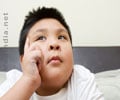Kids whose moms and dads are healthy role models and who encourage them to exercise and eat well, are more likely to be active and healthy eaters, researchers conclude.

Exercise and healthy diets are critical in fighting childhood obesity, a considerable problem in the United States, where over a quarter of kids ages two to five are already overweight or obese.
"Obesity is a complex phenomenon, which is influenced by individual biological factors and behaviors," said study author Truls Østbye, M.D., PhD, professor of community and family medicine at Duke. "But there are variations in obesity from one society to another and from one environment to another, so there is clearly something in the environment that strongly influences the obesity epidemic."
The home environment and parenting can influence a child's health by shaping dietary and physical behaviors, such as providing access to fruits and vegetables or encouraging kids to play outside.
"The 'obesiogenic' environment is broad and multi-faceted, including the physical neighborhood environment, media and advertising, and food tax policies, but we feel that the home environment is critical, particularly among children. However, we didn't have a lot of evidence as to how important this was," Østbye said.
In this study, Østbye and his colleagues examined the relationship between the home environment and behaviors related to obesity – dietary and exercise habits – among preschoolers.
Advertisement
The mothers reported information about their children's environments, including family policies around food and physical activity, accessibility of healthy versus junk foods, availability of physical activity equipment, and whether they model healthy eating or exercise for their kids.
Advertisement
For example, limiting access to junk foods at home and parental policies supporting family meals increased the amount of healthy foods kids ate. Overall, the home environment had more influence on the children's dietary habits than on their physical activity levels.
This study reminds parents that their children are watching and learning from observing their behaviors, both good and bad.
"It's hard for parents to change their behaviors, but not only is this important for you and your own health; it is also important for your children because you are a role model for them," said Marissa Stroo, a co-investigator on the study. "This might be common sense, but now we have some evidence to support this."
The researchers also looked at socioeconomic factors of the mothers, including their education levels and whether they worked, to see if this had an effect on the children's behaviors. The mother's socioeconomic factors did not affect their kids' physical activity, but had mixed results when it came to their dietary habits.
Further research is needed to better understand how a mother's socioeconomic factors influence her child's health, but it is possible that different strategies may be needed to prevent obesity in children depending on a mother's education and work status. More research is also necessary to see if the influence of the home environment changes as children get older, and if parenting strategies should adapt accordingly.
Source-Eurekalert















